英语词性变化
高中英语2024高考复习词形词性变化汇总(共九组)
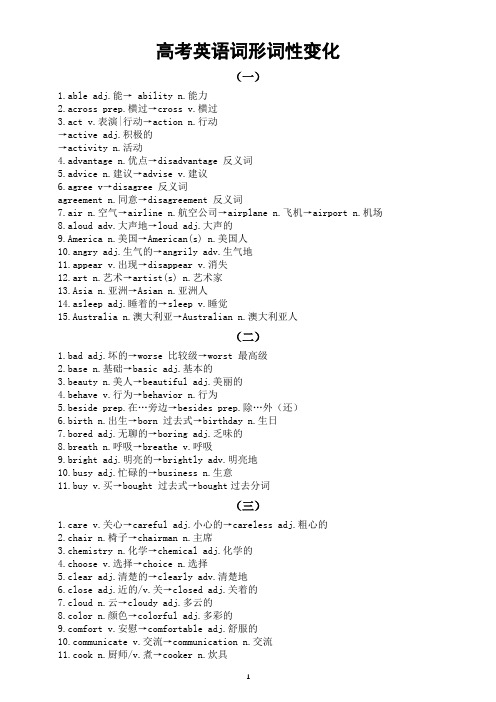
高考英语词形词性变化(一)1.able adj.能→ ability n.能力2.across prep.横过→cross v.横过3.act v.表演|行动→action n.行动→active adj.积极的→activity n.活动4.advantage n.优点→disadvantage 反义词5.advice n.建议→advise v.建议6.agree v→disagree 反义词agreement n.同意→disagreement 反义词7.air n.空气→airline n.航空公司→airplane n.飞机→airport n.机场8.aloud adv.大声地→loud adj.大声的9.America n.美国→American(s) n.美国人10.angry adj.生气的→angrily adv.生气地11.appear v.出现→disappear v.消失12.art n.艺术→artist(s) n.艺术家 n.亚洲→Asian n.亚洲人14.asleep adj.睡着的→sleep v.睡觉15.Australia n.澳大利亚→Australian n.澳大利亚人(二)1.bad adj.坏的→worse 比较级→worst 最高级2.base n.基础→basic adj.基本的3.beauty n.美人→beautiful adj.美丽的4.behave v.行为→behavior n.行为5.beside prep.在…旁边→besides prep.除…外(还)6.birth n.出生→born 过去式→birthday n.生日7.bored adj.无聊的→boring adj.乏味的8.breath n.呼吸→breathe v.呼吸9.bright adj.明亮的→brightly adv.明亮地10.busy adj.忙碌的→business n.生意11.buy v.买→bought 过去式→bought过去分词(三)1.care v.关心→careful adj.小心的→careless adj.粗心的2.chair n.椅子→chairman n.主席3.chemistry n.化学→chemical adj.化学的4.choose v.选择→choice n.选择5.clear adj.清楚的→clearly adv.清楚地6.close adj.近的/v.关→closed adj.关着的7.cloud n.云→cloudy adj.多云的8.color n.颜色→colorful adj.多彩的fort v.安慰→comfortable adj.舒服的municate v.交流→communication n.交流11.cook n.厨师/v.煮→cooker n.炊具12.correct adj.正确的→correctly adv.正确地13.courage n.勇气→encourage v.鼓励→discourage v.阻止(四)1.day n.天→daily adj.日常的2.danger n.危险→dangerous adj.有危险的3.die v.死→died 死(过去式)→dead adj.死了的→dying adj. 快死了的→death n.死亡4.decide v.决定→decision n.决定5.develop v.发展→developed adj.发达的→developing adj.发展中的6.different adj.不同的→difference n.不同点7.difficult adj.难的→difficulty n.困难8.direct adj.直接的/v.指导→indirect adj.间接的→director n.导演→director n.方向9.discover v.发现→cover v.覆盖→discovery n.发现10.discuss v.讨论→discussion n.讨论11.draw v.画→drawer n.抽屉12.drive v.开车→driver n.司机(五)1.east n.东方/adj.东方的→eastern adj.东方的2.easy adj.容易的→easily adv.容易地cate v.教育→education n.教育4.eight num.八→eighteen num.十八→eighth num.第八→eighty num.八十5.electric adj.电动的→electricity n.电→electronic n.电子6.Europe n.欧洲→European adj.欧洲的7.excite v.使兴奋→excited adj.兴奋的→exciting adj.令人兴奋的8.express v.表达→expression n.表达→expressive adj.富有表现力的(六)1.fall v.落→fell 过去式→fallen 过去分词2.far adj.远的→farther 比较级→farthest 最高级3.farm n.农场→farmer n.农民4.fat adj.胖的→fatter 比较级5.feel v.感觉→feeling n.感觉6.five num.五→fifth num.第五→fifty num.五十7.fill v.填满→filled adj.充满的8.first num.第一→one num.一→once 一次9.fly v.飞→flight n.飞行/航班10.foreign adj.外国的→foreigner n.外国人11.friend n.朋友→friendly adj.友好的→friendship n.友谊12.fun n.兴趣→funny adj.有趣的(七)1.half n一半→halves n (复数)2.happy adj 高兴的→happily 高兴地→happiness n 幸福/快乐3.health n 健康→healthy adj 健康的4.hear v 听见→heard v (过去式)→ heard(过去式)5.heavy adj 重的→heavily adv 重地6.high adj 高的→height n 高度7.help v 帮助→helpful adj 有帮助的8.hero n 英雄→heroes (复数)9.hide v 隐藏→hide(过去式)→hidden(过去分词)10.he pron 他→him他(宾)→his他的→himself他自己11.hold v 举行→held 过去式→held过去分词12.home n 家→homeless adj.无家可归的13.hope v.n 希望→hopeful adj 有希望的→hopeless adj. 无望的14.hunger n 饥饿→hungry adj 饥饿的(八)1.ill adj 有病的→illness n 疾病2.important adj重要的→importance n重要性3.impossible adj 不可能的→possible adj 可能的4.invent v发明→inventor n 发明家→invention n发明物5.interest n 兴趣→interesting adj 有趣的→interested adj 感兴趣的6.introduce v 介绍→introduction n 介绍7.invite v 邀请→invitation n 邀请8.kind adj 善良的 n 种类→kindness n 善良9.knife n 小刀→knives (复数)10.know v 知道→knew 过去式→known 过去分词→knowledge n 知识(九)1. lay v 放置→laid过去式→laid过去分词2.lead.v领导→leader.n.领导人3.leaf.n.叶子→leaves. 复数4.little.adj.少→less比较级→least最高级5.lie.躺→lay过去式→lain过去分词6.live.v生活→life n.生活→lively adj.活泼的7.lose.v.丢失→lost过去式→lost过去分词8.love.v.爱→lovely adj.可爱的9.luck.n.运气→lucky adj.好运的→unlucky adj.不幸的→luckily adv.幸运地→unluckily adv.不幸地。
英语单词词性转换的基本规律
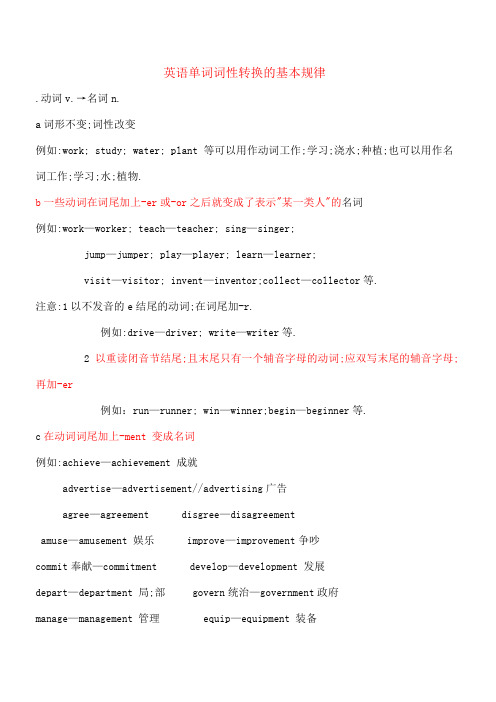
英语单词词性转换的基本规律.动词v.→名词n.a词形不变;词性改变例如:work; study; water; plant等可以用作动词工作;学习;浇水;种植;也可以用作名词工作;学习;水;植物.b一些动词在词尾加上-er或-or之后就变成了表示"某一类人"的名词例如:work—worker; teach—teacher; sing—singer;jump—jumper; play—player; learn—learner;visit—visitor; invent—inventor;collect—collector等.注意:1以不发音的e结尾的动词;在词尾加-r.例如:drive—driver; write—writer等.2以重读闭音节结尾;且末尾只有一个辅音字母的动词;应双写末尾的辅音字母;再加-er例如:run—runner; win—winner;begin—beginner等.c在动词词尾加上-ment 变成名词例如:achieve—achievement 成就advertise—advertisement//advertising广告agree—agreement disgree—disagreementamuse—amusement 娱乐 improve—improvement争吵commit奉献—commitment develop—development 发展depart—department 局;部 govern统治—government政府manage—management 管理 equip—equipment 装备有些单词比较特殊;需把动词后的e去掉再加ment.例如:argue—argument争论d在动词词尾加上-tion/sion变成名词例如: attract—attraction; instruct—instruction;invent—invention discuss—discussion;express—expression educate—education;graduate—graduation; operate—operation 去e再加"ion"compete—competition; organize—organization 把e改成其他字母再加"tion" decide—decision conclude—conclusion 把de改为s再加"ion"describe—description描写;描绘这是特例;不规则变化e在动词词尾加上-ance变成名词例如: appear—appearance 外貌;出现perform—performance 演出accept—acceptance 接受f在动词词尾加-ing变成名词方法与动词变为现在分词的方法相同例如:meet—meeting build—building wait—waiting bathe—bathing say—saying谚语 mean—meaningend —ending train —training wash—washing注意:以重读闭音节结尾;且末尾只有一个辅音字母的动词;应双写末尾的辅音字母;再加-ing如:swim—swimming shop—shopping begin—beginningg其他一些比较特殊的变化例如: Beg乞讨—beggar乞丐 behave行为举止—behaviorknow知道—knowledge知识 fly—flight 飞行heat 加热—heat热量 hit 撞击—hit 轰动一时的人或物;碰撞mix 混合—mixture混合物 press按;压—pressure压力sit坐—seat 座位 succeed—success成功tour—tour旅游/ tourist 游客2.动词v.→形容词adj.a动词后面加able;以e结尾的动词则去e加able;表示具有此性质;特点或属性.例如: afford-affordable;love-lovableb动词后面加ed;以e结尾的动词则直接加d;表示被动性的属性或特点.例如: scatter-scattered use-usedc不规则的动词则必须记忆;记住其过去分词形式.规律不大;意义同b.3.名词n.→形容词adj.a在名词后面加-y可以变成形容词尤其是一些与天气有关的名词例如: rain—rainy; cloud—cloudy; wind—windy; snow—snowy;health—healthy; luck—lucky;anger—angry guilt—guilty内疚的tourist—touristy游客多的 ; salt 盐—salty 咸的silk丝绸—silky丝绸般的; sleep—sleepy 昏昏欲睡的注意:1如果以重读闭音节结尾;且词尾只有一个辅音字母;这时应双写辅音字母再加"-y".如: sun—sunny; fun—funny; fog—foggy有雾的; fur—furry毛皮的2少数以不发音的e结尾的名词变为形容词时;应去掉e再加"-y".如: noise—noisy; ice—icy; shine—shiny发亮的; taste口味—tasty甜的b名词后面加-ed;以e结尾的直接加d.例如: spot斑点—spotted有斑点的; talent—talented 有天赋的organize—organized 有组织的; balance—balanced平衡的c一些抽象名词在词尾加-ful可以变为形容词例如:care—careful; thank—thankful; help—helpful;use—useful; meaning—meaningfuld在名词后加-less构成含有否定意义的形容词例如:care—careless粗心的; use—useless无用的hope—hopeless没希望的;home—homeless无家可归的e一些以-ce结尾的名词;把-ce改为-t变成形容词例如: difference—different; silence—silent; confidence—confidentf.在名词后加-ly变为形容词例如: friend—friendly; love—lovely; live---livelyg.在名词后加-ous变为形容词例如: danger—dangeroush名词后面加-al变为形容词例如: music—musical; medicine—medical 这个比较特殊i名词后面加-able变为形容词;如果以e结尾就去e再加"-able".例如: adjust—adjustable 可调整的 value—valuable有价值的j名词后面加-en变成形容词例如: wood—wooden 木制的 wool—woolen 羊毛的k一些表示国家的名词可以在词尾加-ese; -ish或-n构成表示国籍;语言的形容词例如:China—Chinese; Japan—Japanese; England—English;America—American; India—Indian; Australia —Australian 注意Canada—Canadian4..形容词adj.→副词adv.▲一般在形容词的词尾加-ly可以变成副词例如: quick—quickly; slow—slowly; loud—loudly; sudden—suddenly 等但是;以下几点值得注意:a 一些以"辅音字母+y"结尾的形容词;要把y改为i再加-ly例如: happy—happily; angry—angrily; lucky—luckily; heavy—heavily; noisy—noisilyb 有些以-ble或-le结尾的形容词;去掉e加-y例如:possible—possibly; terrible—terriblyc少数以e结尾的形容词;要去掉e再加-ly例如: true—truly但绝大多数以e结尾的形容词仍然直接加-ly 例如: polite—politely; wide—widely d以-l结尾的形容词变为副词时要在词尾加-ly;以-ll结尾的才在词尾只加-y.例如: usual—usually; careful—carefully; useful—usefullyfull—fully 以-ll结尾的才只加yOK;以上就是英语单词词性变化的一般规律;希望对大家有所帮助PS:有些同学可能对元音辅音以及重读闭音节不是很了解;那我在这里再做下补充说明. 1.英语26个字母中;a e i o u是元音字母; y是半元音字母; 其余都是辅音字母.★所谓半元音就是有时候做元音;有时候做辅音.半元音字母y做元音有: shy;sky做辅音比如最简单的:yes2.开音节和闭音节开音节分两种:绝对开音节和相对开音节绝对开音节指的是"元音字母结尾"的音节例如 we; hi等相对开音节是指"辅音字母-元音字母-辅音字母-不发音的e"的音节;r除外. 例如;take;make等比如:take 在这个单词中;t是辅音;a是元音;k是辅音;e是不发音的元音◆在开音节中; 元音字母发他们在字母表中的音闭音节; 则是指"辅音字母-元音字母-辅音字母"的音节 -al等除外例如:leg;cross 等◆在闭音节中;元音字母发不同的音a e i o u例 sat let sit not nut 试着读下这些单词;这些单词中;元音发的音都不是它们在字母表中发的音2.英语重读闭音节就是以辅音因素结尾的;而且是重读音节的音节.比如apple 划音节就因该是ap/ple 前面那个ap是一个音节;这个音节以辅音因素p结尾;所以就是闭音节.仅仅能看出是闭音节;是不是重读闭音节还要看这个音节是不是重读的重读闭音节三要素:1. 必须是重读音节;2. 最后只有一个辅音字母;3.元音字母发短元音说通俗点;打个比方; /u/是短元音;/u:/是长元音重读闭音节即两个辅音中间夹一个元音.如:sit---sitting begin---beginning重读在gin这个音节上●像travel这个单词;"vel"也是"辅音+元音+辅音"的结构;但是重音不在vel这个音节上;所以不用双写"l";可以为travelled;也可以是traveled;更常用的是后者.。
英语单词词性转变的一般规律
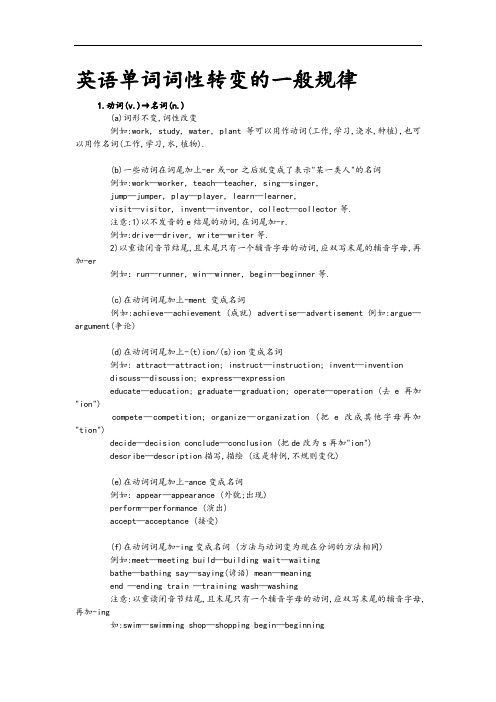
英语单词词性转变的一般规律1.动词(v.)→名词(n.)(a)词形不变,词性改变例如:work, study, water, plant等可以用作动词(工作,学习,浇水,种植),也可以用作名词(工作,学习,水,植物).(b)一些动词在词尾加上-er或-or之后就变成了表示"某一类人"的名词例如:work—worker, teach—teacher, sing—singer,jump—jumper, play—player, learn—learner,visit—visitor, invent—inventor, collect—collector等.注意:1)以不发音的e结尾的动词,在词尾加-r.例如:drive—driver, write—writer等.2)以重读闭音节结尾,且末尾只有一个辅音字母的动词,应双写末尾的辅音字母,再加-er例如:run—runner, win—winner, begin—beginner等.(c)在动词词尾加上-ment 变成名词例如:achieve—achievement (成就) advertise—advertisement例如:argue—argument(争论)(d)在动词词尾加上-(t)ion/(s)ion变成名词例如: attract—attraction; instruct—instruction; invent—inventiondiscuss—discussion; express—expressioneducate—education; graduate—graduation; operate—operation (去e再加"ion")compete—competition; organize—organization (把e改成其他字母再加"tion")decide—decision conclude—conclusion (把de改为s再加"ion")describe—description描写,描绘 (这是特例,不规则变化)(e)在动词词尾加上-ance变成名词例如: appear—appearance (外貌;出现)perform—performance (演出)accept—acceptance (接受)(f)在动词词尾加-ing变成名词 (方法与动词变为现在分词的方法相同)例如:meet—meeting build—building wait—waitingbathe—bathing say—saying(谚语) mean—meaningend —ending train —training wash—washing注意:以重读闭音节结尾,且末尾只有一个辅音字母的动词,应双写末尾的辅音字母,再加-ing如:swim—swimming shop—shopping begin—beginning(g)其他一些比较特殊的变化例如: Beg(乞讨)—beggar(乞丐) behave(行为举止)—behaviorknow(知道)—knowledge(知识) fly—flight (飞行)heat (加热)—heat(热量) hit (撞击)—hit( 轰动一时的人或物,碰撞)mix (混合)—mixture(混合物) press(按,压)—pressure(压力)sit(坐)—seat (座位) succeed—success(成功)tour—tour(旅游)/ tourist (游客)2.动词(v.)→形容词(adj.)(a)动词后面加able,以e结尾的动词则去e加able,表示具有此性质,特点或属性.例如: afford-affordable;love-lovable(b)动词后面加ed,以e结尾的动词则直接加d,表示被动性的属性或特点.例如: scatter-scattereduse-used(c)不规则的动词则必须记忆,记住其过去分词形式.规律不大,意义同(b).3.名词(n.)→形容词(adj.)(a)在名词后面加-y可以变成形容词(尤其是一些与天气有关的名词)例如: rain—rainy, cloud—cloudy, wind—windy, snow—snowy,health—healthy, luck—lucky, anger—angry guilt—guilty(内疚的)tourist—touristy(游客多的) , salt (盐)—salty (咸的)silk(丝绸)—silky(丝绸般的), sleep—sleepy (昏昏欲睡的)注意:1)如果以重读闭音节结尾,且词尾只有一个辅音字母,这时应双写辅音字母再加"-y".如: sun—sunny, fun—funny, fog—foggy(有雾的), fur—furry(毛皮的)2)少数以不发音的e结尾的名词变为形容词时,应去掉e再加"-y".如: noise—noisy, ice—icy, shine—shiny(发亮的), taste(口味)—tasty(甜的)(b)名词后面加-ed,以e结尾的直接加d.例如: spot(斑点)—spotted(有斑点的); talent—talented (有天赋的)organize—organized 有组织的; balance—balanced(平衡的)(c)一些抽象名词在词尾加-ful可以变为形容词例如:care—careful, thank—thankful, help—helpful,use—useful, meaning—meaningful(d)在名词后加-less构成含有否定意义的形容词例如:care—careless(粗心的), use—useless(无用的)hope—hopeless(没希望的),home—homeless(无家可归的)(e)一些以-ce结尾的名词,把-ce改为-t变成形容词例如: difference—different, silence—silent, confidence—confident(f).在名词后加-ly变为形容词例如: friend—friendly, love—lovely, live---lively(g).在名词后加-ous变为形容词例如: danger—dangerous(h)名词后面加-al变为形容词例如: music—musical; medicine—medical (这个比较特殊)(i)名词后面加-able变为形容词,如果以e结尾就去e再加"-able".例如: adjust—adjustable 可调整的value—valuable有价值的(j)名词后面加-en变成形容词例如: wood—wooden 木制的wool—woolen 羊毛的(k)一些表示国家的名词可以在词尾加-ese, -ish或-n构成表示国籍,语言的形容词例如:China—Chinese, Japan—Japanese, England—English,America—American, India—Indian, Australia —Australian(注意Canada—Canadian)4..形容词(adj.)→副词(adv.)▲一般在形容词的词尾加-ly可以变成副词例如: quick—quickly, slow—slowly, loud—loudly, sudden—suddenly 等但是,以下几点值得注意:(a) 一些以"辅音字母+y"结尾的形容词,要把y改为i再加-ly例如: happy—happily, angry—angrily, lucky—luckily, heavy—heavily, noisy—noisily(b) 有些以-ble或-le结尾的形容词,去掉e加-y例如:possible—possibly, terrible—terribly(c)少数以e结尾的形容词,要去掉e再加-ly例如: true—truly但绝大多数以e结尾的形容词仍然直接加-ly 例如: polite—politely, wide—widely(d)以-l结尾的形容词变为副词时要在词尾加-ly,以--ll结尾的才在词尾只加-y.例如: usual—usually, careful—carefully, useful—usefullyfull—fully (以-ll结尾的才只加y)英语词汇后缀系列(一)——形容词后缀able以“-able”结尾的形容词一般有两种情况:(1)v.+able→adj. 以这种方式构成的形容词其意义为“能……的”、“可以(被)……的”、“适合于……的”、“值得……的”等,即有被动含义。
高中英语2025届高考常考词性变化(形容词和副词)
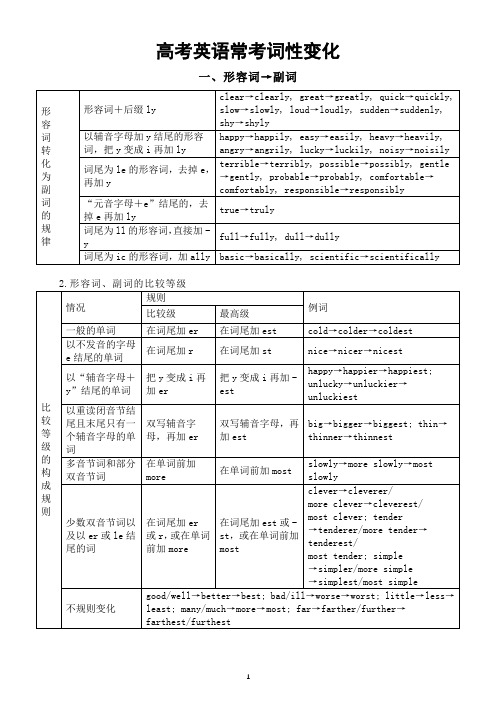
高考英语常考词性变化二、名词转换为形容词(1)ful,less结尾的形容词;aim→aimless 无目标的beauty→beautiful 美丽的breath→breathless 上气不接下气的care→careful→careless 小心的/粗心的color→colorful→colorless 多彩的/无色的cheer→cheerful 高兴的doubt→doubtful→doubtless 可疑的,不确定的/无疑的end→endless 无休止的faith→faithful 忠实的fear→fearful 可怕的home→homeless 无家可归的harm→harmful→harmless 有害的/无害的hope→hopeful→hopeless 抱有希望的/无望的help→helpful→helpless 有帮助的,愿意帮忙的/无助的job→jobless 无工作的joy→joyful 高兴的meaning→meaningful 有意义的mind→mindless 不留神的,愚蠢的peace→peaceful 和平的pain→painful→painless 痛苦的/不痛的power→powerful→powerless 强有力的/无力的price→priceless 珍贵的,无价的speech→speechless 说不出话的self→selfless 无私的success→successful 成功的thank→thankful 感激的tire→tireless 不知疲倦的use→useful 有用的wire→wireless 无线的①[2019·全国卷Ⅰ]Learning English as a second language can bea painful experience.把英语作为第二语言学习可能是一段痛苦的经历。
②[2017·北京高考]Jane moved aimlessly down the treelined street, not knowing where she was heading.简漫无目的地沿着绿树成荫的街道往前走,不知道要去哪里。
英语单词词性转换的基本规律
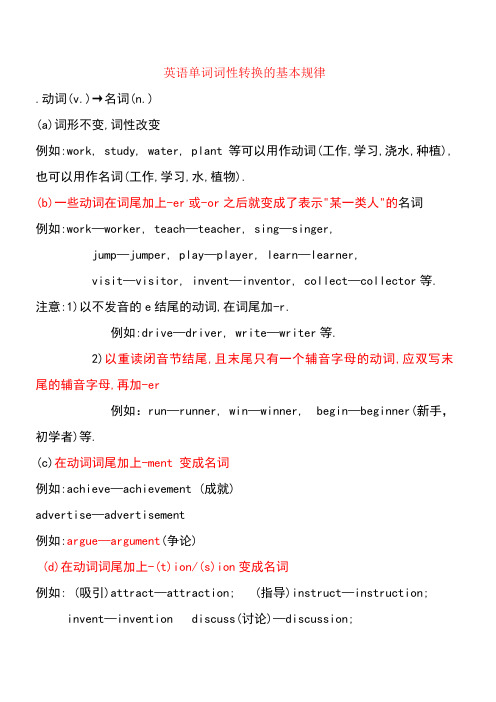
英语单词词性转换的基本规律.动词(v.)→名词(n.)(a)词形不变,词性改变例如:work, study, water, plant等可以用作动词(工作,学习,浇水,种植),也可以用作名词(工作,学习,水,植物).(b)一些动词在词尾加上-er或-or之后就变成了表示"某一类人"的名词例如:work—worker, teach—teacher, sing—singer,jump—jumper, play—player, learn—learner,visit—visitor, invent—inventor, collect—collector等.注意:1)以不发音的e结尾的动词,在词尾加-r.例如:drive—driver, write—writer等.2)以重读闭音节结尾,且末尾只有一个辅音字母的动词,应双写末尾的辅音字母,再加-er例如:run—runner, win—winner, begin—beginner(新手,初学者)等.(c)在动词词尾加上-ment 变成名词例如:achieve—achievement (成就) advertise—advertisement例如:argue—argument(争论)(d)在动词词尾加上-(t)ion/(s)ion变成名词例如: (吸引)attract—attraction; (指导)instruct—instruction;invent—invention discuss(讨论)—discussion;express(表达)—expression educate—education;graduate—graduation; operate(操作,动手术)—operation (去e 再加"ion")compete(竞赛,比赛)—competition;organize—organization (把e改成其他字母再加"tion")decide—decision conclude(结束,推断,决定)—conclusion (结论,结局) (把de改为s再加"ion")describe—description描写,描绘 (这是特例,不规则变化)(e)在动词词尾加上-ance变成名词例如: appear—appearance (外貌;出现)Perform(表演)—performance (演出)accept—acceptance (接受)(f)在动词词尾加-ing变成名词 (方法与动词变为现在分词的方法相同)例如:meet(遇见)—meeting(会议) build—building wait —waitingbathe—bathing say—saying(谚语) mean—meaning(意义,含义)end(结束) —ending(结尾,结局) train(火车,训练) —training(训练) wash(洗涤)—washing注意:以重读闭音节结尾,且末尾只有一个辅音字母的动词,应双写末尾的辅音字母,再加-ing如:swim—swimming shop—shopping begin—beginning(g)其他一些比较特殊的变化例如: Beg(乞讨)—beggar(乞丐) behave(行为举止)—behaviorknow(知道)—knowledge(知识) fly—flight (飞行)heat (加热)—heat(热量) hit (撞击)—hit( 轰动一时的人或物,碰撞)mix (混合)—mixture(混合物) press(按,压)—pressure(压力)sit(坐)—seat (座位) succeed—success(成功)tour—tour(旅游)/ tourist (游客)2.动词(v.)→形容词(adj.)(a)动词后面加able,以e结尾的动词则去e加able,表示具有此性质,特点或属性.例如: afford-affordable(负担得起);love-lovable(可爱的)(b)动词后面加ed,以e结尾的动词则直接加d,表示被动性的属性或特点.例如: scatter(分散,散开)-scattered use-used(c)不规则的动词则必须记忆,记住其过去分词形式.规律不大,意义同(b).3.名词(n.)→形容词(adj.)(a)在名词后面加-y可以变成形容词(尤其是一些与天气有关的名词)例如: rain—rainy, cloud—cloudy(多云的,阴天的), wind—windy, snow —snowy,health—healthy, luck—lucky, anger—angry guilt—guilty(内疚的)tourist—touristy(游客多的) , salt (盐)—salty (咸的)silk(丝绸)—silky(丝绸般的), sleep—sleepy (昏昏欲睡的)注意:1)如果以重读闭音节结尾,且词尾只有一个辅音字母,这时应双写辅音字母再加"-y".如: sun—sunny, fun—funny, fog—foggy(有雾的), fur(毛,毛皮)—furry(毛皮的)2)少数以不发音的e结尾的名词变为形容词时,应去掉e再加"-y".如: noise—noisy, ice—icy, shine—shiny(发亮的), taste(口味)—tasty(甜的)(b)名词后面加-ed,以e结尾的直接加d.例如: spot(斑点)—spotted(有斑点的); talent—talented (有天赋的) organize—organized 有组织的; balance—balanced(平衡的) (c)一些抽象名词在词尾加-ful可以变为形容词例如:care—careful, thank—thankful, help—helpful,use—useful, meaning—meaningful(d)在名词后加-less构成含有否定意义的形容词例如:care—careless(粗心的), use—useless(无用的)hope—hopeless(没希望的),home—homeless(无家可归的)(e)一些以-ce结尾的名词,把-ce改为-t变成形容词例如: difference—different, silence(沉默,寂静,无言)—silent,confidence—confident(f).在名词后加-ly变为形容词例如: friend—friendly, love—lovely(可爱的), live---lively (活泼的)(g).在名词后加-ous变为形容词例如: danger—dangerous(h)名词后面加-al变为形容词例如: music—musical; medicine(药,医学)—medical(医学的) (这个比较特殊)(i)名词后面加-able变为形容词,如果以e结尾就去e再加"-able".例如: adjust—adjustable 可调整的value—valuable有价值的(j)名词后面加-en变成形容词例如: wood—wooden 木制的 wool—woolen 羊毛的(k)一些表示国家的名词可以在词尾加-ese, -ish或-n构成表示国籍,语言的形容词例如:China—Chinese, Japan—Japanese, England—English,America—American, India(印度)—Indian, Australia (澳大利亚)—Australian(注意Canada—Canadian)4..形容词(adj.)→副词(adv.)▲一般在形容词的词尾加-ly可以变成副词例如: quick—quickly, slow—slowly, loud—loudly, sudden—suddenly等但是,以下几点值得注意:(a) 一些以"辅音字母+y"结尾的形容词,要把y改为i再加-ly例如: happy—happily, angry—angrily, lucky—luckily, heavy—heavily,noisy—noisily(b) 有些以-ble或-le结尾的形容词,去掉e加-y例如:possible—possibly, terrible—terribly(c)少数以e结尾的形容词,要去掉e再加-ly例如: true—truly但绝大多数以e结尾的形容词仍然直接加-ly 例如: polite—politely,wide—widely(d)以-l结尾的形容词变为副词时要在词尾加-ly,以-ll结尾的才在词尾只加-y.例如: usual—usually, careful—carefully, useful—usefullyfull—fully (以-ll结尾的才只加y)OK,以上就是英语单词词性变化的一般规律,希望对大家有所帮助PS:有些同学可能对元音辅音以及重读闭音节不是很了解,那我在这里再做下补充说明.1.英语26个字母中,a e i o u是元音字母, y是半元音字母, 其余都是辅音字母.★所谓半元音就是有时候做元音,有时候做辅音.半元音字母y做元音有: shy,sky做辅音比如最简单的:yes2.开音节和闭音节开音节分两种:绝对开音节和相对开音节绝对开音节指的是"元音字母结尾"的音节 (例如 we, hi等)相对开音节是指"辅音字母-元音字母-辅音字母-不发音的e"的音节,(r除外). ( 例如,take,make等)比如:take (在这个单词中,t是辅音,a是元音,k是辅音,e是不发音的元音)◆在开音节中, 元音字母发他们在字母表中的音闭音节, 则是指"辅音字母-元音字母-辅音字母"的音节 ( -al等除外) (例如:leg,cross等)◆在闭音节中,元音字母发不同的音a e i o u例 sat let sit not nut (试着读下这些单词,这些单词中,元音发的音都不是它们在字母表中发的音)2.英语重读闭音节就是以辅音因素结尾的,而且是重读音节的音节.比如apple 划音节就因该是ap/ple 前面那个ap是一个音节,这个音节以辅音因素p结尾,所以就是闭音节.(仅仅能看出是闭音节,是不是重读闭音节还要看这个音节是不是重读的)重读闭音节三要素:1. 必须是重读音节;2. 最后只有一个辅音字母;3.元音字母发短元音 ( 说通俗点,打个比方, /u/是短元音,/u:/是长元音)重读闭音节即两个辅音中间夹一个元音.如:sit---sitting begin---beginning(重读在gin这个音节上)●像travel这个单词,"vel"也是"辅音+元音+辅音"的结构,但是重音不在vel 这个音节上,所以不用双写"l",可以为travelled,也可以是traveled,更常用的是后者.。
高中英语高考词汇词性变化规律:动词类变化

高考词汇词性变化规律:动词类变化词性变化之动词类1.动词+后缀-y变为名词deliver —delivery 运送discover —discovery 发现recover — recovery 康复;恢复2.动词+后缀-ing变为名词begin —beginning 开始;开端build —building 建筑〔物〕cross—crossing 十字路口end—ending 结局;结尾engine —engineering 工程feel—feeling 感觉hear—hearing 听力market — marketing 促销meet —meeting 会议paint —painting 绘画;油画spend—spending 花销suffer—suffering 苦难train—training 练习;培养3.动词+后缀-ment变为名词acquire —acquirement n.取得accomplish —accomplishment 成就achieve —achievement 成就adjust —adjustment 调整;调节amuse—amusement 愉快;快乐;消遣announce —announcement 宣告;述说appoint —appointment 约会;预约;任命argue—argument 争论arrange —arrangement 安排assess —assessment 评估assign —assignment 分配;任务astonish —astonishment 惊讶develop —development 开展disappoint —disappointment 失望embarrass —embarrassment 为难employ —employment 雇用enjoy—enjoyment 享受;欢乐entertain —entertainment 款待;娱乐equip—equipment 设备establish —establishment 建立govern —government 统治;政府improve —improvement 提升judge—judgement 判断move - movement 运动;移动punish -punishment 惩罚settle-settlement 定居;解决state-statement 陈述;说明4.动词+后缀-ive变为形容词act-active 积极的attract -attractive 吸引人的cooperate -cooperative 合作的impress -impressive给人印象深刻的protect - protective 保护的relate -relative 相关的sense-sensitive 敏感的object-objective 客观的negative消极的passive被动的positive积极的subjective 主观的5.动词+后缀-able变为形容词accept —acceptable 可接受的adjust —adjustable 可调节的admire —admirable 令人钦佩的afford —affordable 负担得起的change —changeable 易变的comfort —comfortable 舒服的consider —considerable 重要的;相当大的desire—desirable值得做的;可取的enjoy—enjoyable令人愉快的favour—favourable赞成的;有利的forget —forgettable 健忘的honour — honourable 可敬的;荣耀的reach — reachable可获得的;可到达的reason —reasonable 合理的rely—reliable可靠的;可信赖的remark — remarkable 不平凡的suit—suitable 适宜的understand —understandable 可理解的value —valuable 珍贵的6.动词+后缀-ed变为形容词absorb—absorbed专心的;聚精会神的accustom —accustomed 习惯的balance —balanced 平衡的bury—buried 专心的complicate —complicated 复杂的determine —determined 坚决的;有决心的devote —devoted 忠实的experience —experienced 有经验的learn—learned 博学的limit—limited 有限的organize —organized 有组织的suppose —supposed 应该的relate —related 相关的skill—skilled 熟练的unite—united联合的;统一的7.动词+后缀-ing/ + -ed变为形容词amuse—amusing好笑的;有趣的—amused愉快的astonish —astonishing 令人惊讶的—astonished 感到惊讶的bore — boring 令人厌烦的—bored 厌烦的confuse —confusing 令人迷惑的—confused 感到迷惑的convince —convincing 令人信服的—convinced 坚信不移的depress —depressing 令人沮丧的—depressed 沮丧的disappoint —disappointed 失望的—disappointing 令人失望的disturb—disturbing 令人不安的;引起烦恼的—disturbed 扰乱的;精神失常的embarrass —embarrassing 令人为难的一embarrassed 为难的excite—exciting 令人兴奋的—excited 兴奋的frighten —frightening 令人害怕的—frightened 害怕的relax — relaxing使人放松的—relaxed轻松的satisfy—satisfying 令人满意的—satisfied 对满意的shock—shocking 令人震惊的—shocked 震惊的surprise —surprising 令人吃惊的—surprised 吃惊的tire—tiring令人疲劳的—tired疲劳的8.动词+后缀-tion变为名词accelerate —acceleration 加速accumulate —accumulation 积累adapt—adaptation 适应;改编addict—addiction 沉溺;嗜好admire —admiration 羡慕advocate —advocation 拥护apply—application 申请appreciate —appreciation 感谢;欣赏assume —assumption 假定;设想celebrate —celebration 庆祝classify—classification 分类;归类combine —combination 联合congratulate —congratulation 祝贺construct —construction 建筑物consume —consumption 消费contradict —contradiction 反驳contribute —contribution 奉献cooperate —cooperation 合作correct —correction 改正;纠正create—creation 创造;创立declare —declaration 宣言;公告decorate —decoration 装饰decorate —decoration 装饰determine —determination 决心digest —digestion 消化elect—election 竞选;选举erupt—eruption 火山爆发evaluate —evaluation 评估exhibit—exhibition 展览;展览会expect —expectation 期望;期待fascinate —fascination 魅力;入迷graduate —graduation 毕业graduate —graduation 毕业hesitate —hesitation 犹豫;踌躇imagine —imagination 想象immigrate —immigration 迁移;移居indicate —indication 指示;暗示infect—infection 传染interrupt —interruption 中断object—objection 反对occupy —occupation 占领;占据organize —organization 组织pollute —pollution 污染predict —prediction 预言prepare —preparation 准备protect — protection 保护recommend —recommendation 推荐;介绍reflect—reflection 思考;反映regulate —regulation 规那么;规章reject — rejection 拒绝;抛弃relax — relaxation 放松satisfy —satisfaction 满意;满足starve—starvation 挨饿;饿死substitute —substitution 代替;取代translate —translation 译transport —transportation 交通9.动词+后缀-ure变为名词press — pressure 压力please—pleasure 乐事;快乐expose —exposure 暴露;揭发fail—failure 失败mix—mixture 混合物10.动词+后缀-sion变为名词admit—admission 容许;成认permit — permission 允许impress —impression 印象express —expression 表情;表达revise —revision 复习possess —possession 拥有conclude —conclusion 结论confuse —confusion 困惑;混淆decide —decision 决定11.动词/形容词+后缀-ance变为名词guide—guidance 指导tolerate —tolerance 宽容ignore—ignorance 无知;愚昧appear—appearance 出现important —importance 重要〔性〕elegant —elegance 优雅大方assist —assistance 援助resist— resistance 反抗guide—guidance 指导annoy—annoyance 恼怒10。
英语词性转换
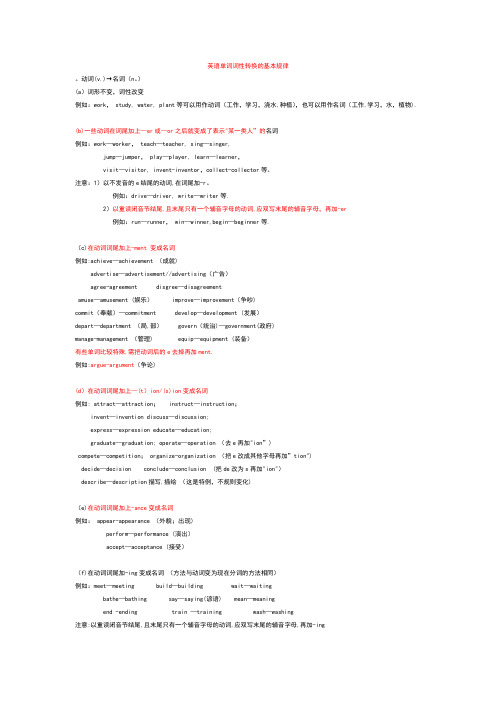
英语单词词性转换的基本规律。
动词(v.)→名词(n。
)(a)词形不变,词性改变例如:work, study, water, plant等可以用作动词(工作,学习,浇水,种植),也可以用作名词(工作,学习,水,植物).(b)一些动词在词尾加上—er或—or之后就变成了表示"某一类人”的名词例如:work—worker, teach—teacher, sing—singer,jump—jumper, play—player, learn—learner,visit—visitor, invent-inventor,collect-collector等。
注意:1)以不发音的e结尾的动词,在词尾加-r。
例如:drive—driver, write—writer等.2)以重读闭音节结尾,且末尾只有一个辅音字母的动词,应双写末尾的辅音字母,再加-er例如:run—runner, win—winner,begin—beginner等.(c)在动词词尾加上-ment 变成名词例如:achieve—achievement (成就)advertise—advertisement//advertising(广告)agree-agreement disgree—disagreementamuse—amusement (娱乐) improve—improvement(争吵)commit(奉献)—commitment develop—development (发展)depart—department (局,部) govern(统治)—government(政府)manage-management (管理) equip—equipment (装备)有些单词比较特殊,需把动词后的e去掉再加ment.例如:argue-argument(争论)(d)在动词词尾加上—(t)ion/(s)ion变成名词例如: attract—attraction; instruct—instruction;invent—invention discuss—discussion;express—expression educate—education;graduate—graduation; operate—operation (去e再加"ion”)compete—competition; organize-organization (把e改成其他字母再加”tion")decide—decision conclude—conclusion (把de改为s再加"ion")describe—description描写,描绘(这是特例,不规则变化)(e)在动词词尾加上-ance变成名词例如: appear-appearance (外貌;出现)perform—performance (演出)accept—acceptance (接受)(f)在动词词尾加-ing变成名词(方法与动词变为现在分词的方法相同)例如:meet—meeting build—building wait—waitingbathe—bathing say—saying(谚语) mean—meaningend -ending train —training wash—washing注意:以重读闭音节结尾,且末尾只有一个辅音字母的动词,应双写末尾的辅音字母,再加-ing如:swim—swimming shop—shopping begin—beginning(g)其他一些比较特殊的变化例如: Beg(乞讨)—beggar(乞丐) behave(行为举止)—behaviorknow(知道)—knowledge(知识) fly-flight (飞行)heat (加热)—heat(热量) hit (撞击)—hit(轰动一时的人或物,碰撞)mix (混合)-mixture(混合物) press(按,压)—pressure(压力)sit(坐)-seat (座位) succeed—success(成功)tour—tour(旅游)/ tourist (游客)2.动词(v.)→形容词(adj。
高中英语高考复习词性变化规律总结(共46种类型)
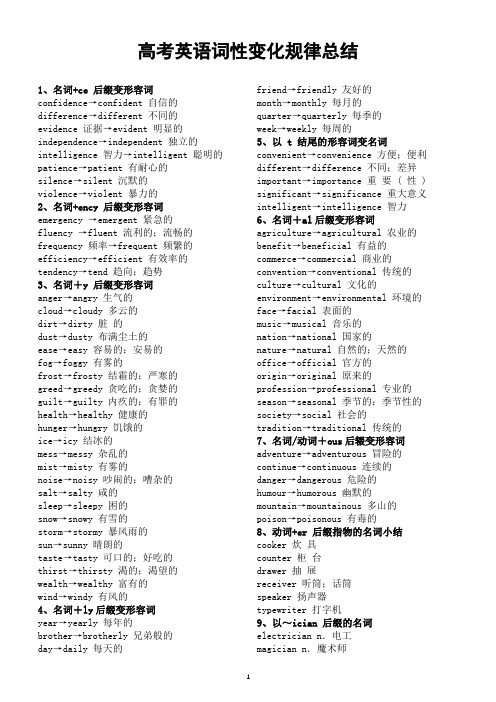
高考英语词性变化规律总结1、名词+ce 后缀变形容词confidence→confident 自信的difference→different 不同的evidence 证据→evident 明显的independence→independent 独立的intelligence 智力→intelligent 聪明的patience→patient 有耐心的silence→silent 沉默的violence→violent 暴力的2、名词+ency 后缀变形容词emergency →emergent 紧急的fluency →fluent 流利的;流畅的frequency 频率→frequent 频繁的efficiency→efficient 有效率的tendency→tend 趋向;趋势3、名词+y 后缀变形容词anger→angry 生气的cloud→cloudy 多云的dirt→dirty 脏的dust→dusty 布满尘土的ease→easy 容易的;安易的fog→foggy 有雾的frost→frosty 结霜的;严寒的greed→greedy 贪吃的;贪婪的guilt→guilty 内疚的;有罪的health→healthy 健康的hunger→hungry 饥饿的ice→icy 结冰的mess→messy 杂乱的mist→misty 有雾的noise→noisy 吵闹的;嘈杂的salt→salty 咸的sleep→sleepy 困的snow→snowy 有雪的storm→stormy 暴风雨的sun→sunny 晴朗的taste→tasty 可口的;好吃的thirst→thirsty 渴的;渴望的wealth→wealthy 富有的wind→windy 有风的4、名词+ly后缀变形容词year→yearly 每年的brother→brotherly 兄弟般的day→daily 每天的friend→friendly 友好的month→monthly 每月的quarter→quarterly 每季的week→weekly 每周的5、以 t 结尾的形容词变名词convenient→convenience 方便;便利different→difference 不同;差异important→importance 重要 ( 性 ) significant→significance 重大意义intelligent→intelligence 智力6、名词+al后缀变形容词agriculture→agricultural 农业的benefit→beneficial 有益的commerce→commercial 商业的convention→conventional 传统的culture→cultural 文化的environment→environmental 环境的face→facial 表面的music→musical 音乐的nation→national 国家的nature→natural 自然的;天然的office→official 官方的origin→original 原来的profession→professional 专业的season→seasonal 季节的;季节性的society→social 社会的tradition→traditional 传统的7、名词/动词+ous后辍变形容词adventure→adventurous 冒险的continue→continuous 连续的danger→dangerous 危险的humour→humorous 幽默的mountain→mountainous 多山的poison→poisonous 有毒的8、动词+er 后缀指物的名词小结cooker 炊具counter 柜台drawer 抽屉receiver 听筒;话筒speaker 扬声器typewriter 打字机9、以~ician 后缀的名词electrician n.电工magician n.魔术师musician n.音乐家physician n.内科医生politician n.政治家technician n.技术员10、以~ist 为后缀的名词art→artist 艺术家biology→biologist 生物学家journal→journalist 新闻工作者;记者physics→physicist 物理学家piano→pianist 钢琴家psychology→psychologist 心理学家science→scientist 科学家social→socialist 社会主义者special→specialist 专家tour→tourist 游客11、以~ology后缀结尾的名词archaeology 考古学biology 生物学ecology 生态学geology 地质学psychology 心理学sociology 社会学technology 技术;工艺12、名词+~ic后缀形容词drama→dramatic 戏剧(性)的energy→energetic 精力充沛的enthusiasm→enthusiastic 热情的romance→romantic 浪漫的science→scientific 科学的sympathy→sympathetic 同情的13、名词+~hood 后缀变名词adult→adulthood 成年boy→boyhood 少年时代brother→brotherhood 手足之情child→childhood 童年man→manhood 男子气概neighbour→neighbourhood 邻里;街坊14、以~ship 后缀的名词championship 冠头军衔friendship 友谊hardship 困苦;苦难leadership 领导地位;领导才能membership 成员资格relationship 关系scholarship 奖学金15、动词+~y 后缀变名词deliver→delivery 运送discover→discovery 发现recover→recovery 康复;恢复16、动词+~ing 后缀变名词begin→beginning 开始;开端build→building 建筑(物)cross→crossing 十字路口end→ending 结局;结尾engine→engineering 工程feel→feeling 感觉hear→hearing 听力market→marketing 促销meet →meeting 会议paint→painting 绘画;油画spend→spending 花销suffer→suffering 苦难train→training 训练;培养17、动词+~ment 后缀变名词acquire→acquirement n. 取得accomplish→accomplishment 成就achieve→achievement 成就adjust→adjustment 调整;调节amuse→amusement 愉快;快乐;消遣announce→announcement 宣告;述说appoint→appointment 约会;预约;任命argue→argument 争论arrange→arrangement 安排assess→assessment 评估assign→assignment 分配;任务astonish→astonishment 惊讶develop→development 发展disappoint→disappointment 失望embarrass→embarrassment 尴尬employ→employment 雇用enjoy→enjoyment 享受;欢乐entertain→entertainment 款待;娱乐equip→equipment 设备establish→establishment 建立govern→government 统治;政府improve→improvement 提高judge→judgement 判断move→movement 运动;移动punish→punishment 惩罚settle→settlement 定居;解决state→statement 陈述;说明18、以~ive 后缀变形容词act→active 积极的attract→attractive 吸引人的cooperate→cooperative 合作的impress→impressive 给人印象深刻的protect→protective 保护的relate→relative 相关的sense→sensitive 敏感的negative 消极的objective 客观的passive 被动的positive 积极的subjective 主观的19、动词+~able后缀变形容词accept→acceptable 可接受的adjust→adjustable 可调节的admire→admirable 令人钦佩的afford→affordable 负担得起的change→changeable 易变的comfort→comfortable 舒服的consider→considerable 重要的;相当大的desire→desirable 值得做的;可取的enjoy→enjoyable 令人愉快的favour→favourable 赞成的;有利的forget→forgettable 健忘的honour→honourable 可敬的;光荣的reach→reachable 可获得的;可达到的reason→reasonable 合理的rely→reliable 可靠的;可信赖的remark→remarkable 不平凡的suit→suitable 合适的understand→understandable 可理解的value→valuable 宝贵的20、动词+~ed 变形容词absorb→absorbed 专心的;聚精会神的accustom→accustomed 习惯的balance→balanced 平衡的bury→buried 专心的complicate→complicated 复杂的determine→determined 坚定的;有决心的devote→devoted 忠实的experience→experienced 有经验的learn→learned 博学的limit→limited 有限的organize→organized 有组织的suppose→supposed 应该的relate→related 相关的skill→skilled 熟练的unit→united 联合的;统一的21、动词+~ing/ +~ed 变形容词amuse→amusing 好笑的;有趣的→amused 愉快的astonish→astonishing 令人惊讶的→astonished 感到惊讶的bore→bored 厌烦的→boring 令人厌烦的confuse→confusing 令人迷惑的→confused 感到迷惑的convince→convincing 令人信服的→convinced 坚信不移的depress→depressing 令人沮丧的→depressed 沮丧的disappoint→disappointed 失望的→disappointing 令人失望的disturb→disturbing 令人不安的;引起烦恼的→disturbed 扰乱的;精神失常的embarrass→embarrassing 令人尴尬的→embarrassed 尴尬的excite→excited 兴奋的→exciting 令人兴奋的frighten→frightened 害怕的→frightening 令人害怕的relax→relaxing 使人放松的→relaxed 轻松的satisfy→satisfying 令人满意的→satisfied 对……满意的shock→shocked 震惊的→shocking 令人震惊的surprise→surprised 吃惊的→surprising 令人吃惊的tire→tired 疲劳的→tiring 令人疲劳的22、动词+~tion后缀变名词accelerate→acceleration 加速accumulate→accumulation 积累adapt→adaptation 适应;改编addict→addiction 沉溺;嗜好admire→admiration 羡慕advocate→advocation 拥护apply→application 申请appreciate→appreciation 感激;欣赏assume→assumption 假定;设想celebrate→celebration 庆祝classify→classification 分类;归类combine→combination 联合congratulate→congratulation 祝贺construct→construction 建筑物consume→consumption 消费contradict→contradiction 反驳contribute→contribution 贡献cooperate→cooperation 合作correct→correction 改正;纠正create→creation 创造;创建declare→declaration 宣言;公告decorate→decoration 装饰decorate→decoration 装饰determine→determination 决心digest→digestion 消化elect→election 竞选;选举erupt→eruption 火山爆发evaluate→evaluation 评估exhibit→exhibition 展览;展览会expect→expectation 期望;期待fascinate→fascination 魅力;入迷graduate→graduation 毕业hesitate→hesitation 犹豫;踌躇imagine→imagination 想象immigrate→immigration 迁移;移居indicate→indication 指示;暗示infect→infection 传染interrupt→interruption 中断object→objection 反对occupy→occupation 占领;占据organize→organization 组织pollute→pollution 污染predict→prediction 预言prepare→preparation 准备protect→protection 保护recommend→recommendation 推荐;介绍reflect→reflection 思考;反映regulate→regulation 规则;规章reject→rejection 拒绝;抛弃relax→relaxation 放松atisfy→satisfaction 满意;满足starve→starvation 挨饿;饿死substitute→substitution 代替;取代translate→translation 翻译transport→transportation 交通23、动词+~ure后缀变名词press→pressure 压力please→pleasure 乐事;快乐expose→exposure 暴露;揭发fail→failure 失败mix→mixture 混合物24、动词+~sion后缀变名词admit→admission 容许;承认permit→permission 允许impress→impression 印象express→expression 表情;表达revise→revision 复习possess→possession 拥有conclude→conclusion 结论confuse→confusion 困惑;混淆decide→decision 决定25、动词/形容词+~ance后缀变名词guide→guidance 指导tolerate→tolerance 宽容ignore→ignorance 无知;愚昧appear→appearance 出现important→importance 重要(性) elegant→elegance 优雅大方assist→assistance 援助resist→resistance 抵抗guide→guidance 指导annoy→annoyance 恼怒26、形容词+~ity 后缀变名词electric→electricity 电;电流;电学equal→equality 平等major→majority 大多数popular→popularity 受欢迎;流行real→reality 现实secure→security 安全similar→similarity 相似点27、以后缀~ity 结尾的名词cruel—cruelty 残忍diverise—diversity 多样性necessary—necessity 必需品;需要possible—possibility 可能性secure—security 安全similar—similarity 相似(性)28、形容词+~en后缀变动词bright→brighten 使愉快;使明亮broad→broaden 加宽;拓宽dark→darken 使变暗deep→deepen 加深;使变深fright→frighten (使)惊吓hard→harden 使变硬light→lighten 使变轻long→lengthen 加长loose→loosen (使)变松;放松;松开quick→quicken 加快ripe→ripen 变成熟;使成熟sharp→sharpen 磨快;使锋利short→shorten 变短;缩短soft→soften 使变软strong→strengthen 加强weak→weaken 使变弱wide→widen 加宽;拓宽29、形容词+~th变名词deep→depth 深;深处grow→growth 成长long→length 长;长度strong→strength 力量true→truth 真理warm→warmth 温暖wide→width 宽度30、形容词+~ness后缀变名词aware→awareness 意识careless→carelessness 粗心大意conscious→consciousness 知觉dark→darkness 黑暗eager→eagerness 渴望happy→happiness 幸福;高兴kind→kindness 仁慈;好意lonely→loneliness 孤独rude→rudeness 粗鲁sad→sadness 悲哀;悲伤sick→sickness 疾病weak→weakness 弱点;虚弱willing→willingness 愿意31、以~ious 结尾的形容词ambitious 有雄心的;野心勃勃的cautious 小心的;谨慎的conscious 有意识的envious 忌妒的;猜忌的mysterious 神秘的religious 宗教上的;信奉宗教的;虔诚的32、以~ical 结尾的形容词economical 经济的;节约的electrical 与电有关的historical 与历史有关的logical 逻辑的magical 神奇的;像变魔术似的musical 音乐的;悦耳的political 政治的33、形容词+~ly 后缀变副词fluent→fluently 流利地frequent→frequently 频繁地;经常地actual→actually 实际上entire→entirely 完全;全部地gradual→gradually 逐渐地fortunate→fortunately 幸运地final→finally 最后extreme→extremely 极其34、动词+前缀dis变否定词agree→disagree 不同意appear→disappear 消失appoint→disappoint 使失望approve→disapprove 反对;不赞成comfort→discomfort 使不舒适cover→discover 发现like→dislike 不喜欢35、形容词+in 前缀变否定词accurate→inaccurate 不精确的adequate→inadequate 不充分的appropriate→inappropriate 不合适的expensive→inexpensive 不贵的;便宜的experienced→inexperienced 经验不足的36、形容词+im前缀变否定词patient→impatient 不耐心的polite→impolite 没礼貌的possible→impossible 不可能的practical→impractical 不实用的proper→improper 不合适的37、形容词+un前缀变否定词able→unable 不能的aware→unaware 不知道的believable→unbelievable 不可相信的certain→uncertain 不确定的clear→unclear 不清楚的comfortable→uncomfortable 不舒服的common→uncommon 不常有的conscious→unconscious 失去知觉的fair→unfair 不公平的forgettable→unforgettable 难忘的fortunate→unfortunate 不幸的fit→unfit 不合适的friendly→unfriendly 不友好的happy→unhappy 不高兴的;不幸福的known→unknown 无名的likely→unlikely 不可能的lucky→unlucky 不幸的necessary→unnecessary 不必要的pleasant→unpleasant 不愉快的unfortunate 不幸的unimportant 不重要的usual→unusual 不寻常的willing→unwilling 不情愿的38、后缀~less构成的形容词aim→aimless 无目的的care→careless 粗心大意的count→countless 无数的doubt→doubtless 无疑的end→endless 无尽的harm→harmless 无害的help→helpless 无助的home→homeless 无家可归的hope→hopeless 无希望的job→jobless 失业的limit→limitless 无限的rest→restless 不安的use→useless 无用的39、含 mis前缀的动词mistake 误会misunderstand 误解misuse 误用;滥用mislead 误导mistrust 不信任40、使动用法“前缀 en+形容词/名词”变动词rich→enrich 使充实able→enable 使能够large→enlarge 使扩大sure→ensure 确保;担保danger→endanger 使……遭遇危险title→entitle 给……起题目/命名courage→encourage 鼓励41、含 fore前缀的单词forecast vt. 预报;预测foresee vt. 预见;预料;预知foreword n. 前言forehead n. 额头forearm n. 前臂forehead n. 额头forearm n. 前臂forecast vt. 预报foresee vt. 预见;预知foreword n. 前言foretell v. 预言;预示42、~ward 后缀方位词southward 向南northward 向北eastward 向东westward 向西upward 向上backward 向后43、以后缀~ify结尾的动词simple→simplify 简化beauty→beautify 美化pure→purify 净化identity→identify 鉴定;识别出class→classify 分类44、动词+re前缀变动词cycle→recycle 再利用;回收利用use→reuse 重新使用build→rebuild 重建write→rewrite 重写tell→retell 复述45、注意男女不同steward 乘务员;服务员stewardess 女乘务员waiter 男服务员waitress 女服务员actor 男演员actress 女演员host 男主人hostess 女主人46、现在分词/过去分词用作介词或连词小结assume→assuming 假设;假定include→including 包含;包括suppose→supposing 假设;假如provide→provided/providing 假设;如果consider→considering 鉴于;考虑到concern→concerning 关于give→given 鉴于;考虑到。
英语词性转换规则大全
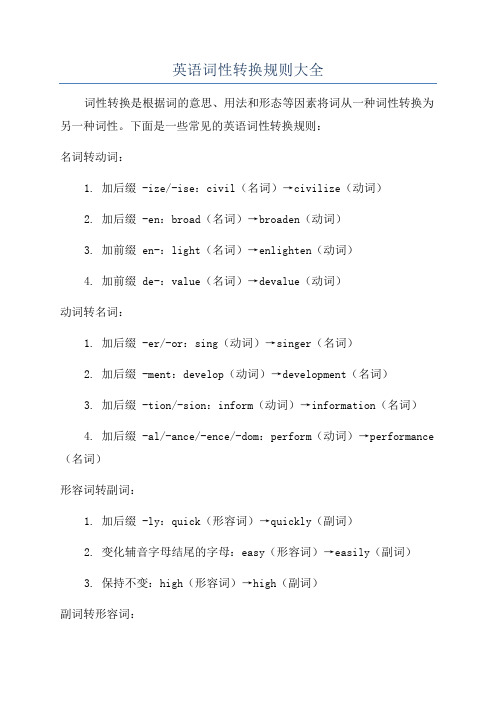
英语词性转换规则大全
词性转换是根据词的意思、用法和形态等因素将词从一种词性转换为另一种词性。
下面是一些常见的英语词性转换规则:
名词转动词:
1. 加后缀 -ize/-ise:civil(名词)→civilize(动词)
2. 加后缀 -en:broad(名词)→broaden(动词)
3. 加前缀 en-:light(名词)→enlighten(动词)
4. 加前缀 de-:value(名词)→devalue(动词)
动词转名词:
1. 加后缀 -er/-or:sing(动词)→singer(名词)
2. 加后缀 -ment:develop(动词)→development(名词)
3. 加后缀 -tion/-sion:inform(动词)→information(名词)
4. 加后缀 -al/-ance/-ence/-dom:perform(动词)→performance (名词)
形容词转副词:
1. 加后缀 -ly:quick(形容词)→quickly(副词)
2. 变化辅音字母结尾的字母:easy(形容词)→easily(副词)
3. 保持不变:high(形容词)→high(副词)
副词转形容词:
1. 去掉后缀 -ly并加后缀 -al:actively(副词)→active(形容词)
2. 去掉后缀 -ly并加后缀 -y:quickly(副词)→quick(形容词)动词转副词:
1. 加后缀 -ly:slow(动词)→slowly(副词)
2. 保持不变:run(动词)→run(副词)
以上是一些常见的英语词性转换规则,但并不是所有词都能完全按照
这些规则进行转换,还需根据具体情况灵活运用。
英语词性转换归纳大全
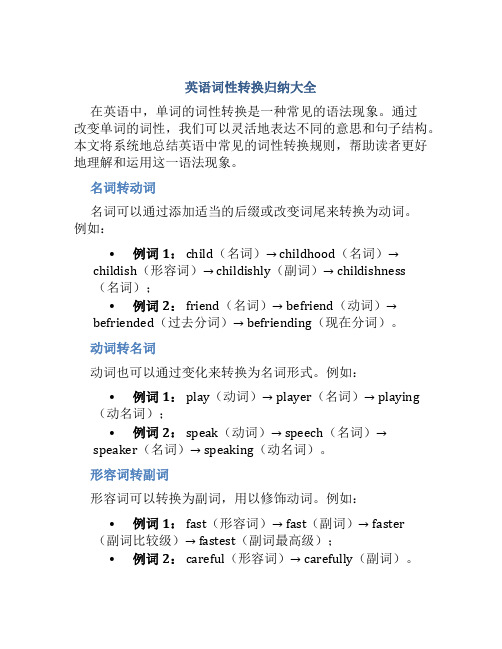
英语词性转换归纳大全在英语中,单词的词性转换是一种常见的语法现象。
通过改变单词的词性,我们可以灵活地表达不同的意思和句子结构。
本文将系统地总结英语中常见的词性转换规则,帮助读者更好地理解和运用这一语法现象。
名词转动词名词可以通过添加适当的后缀或改变词尾来转换为动词。
例如:•例词1: child(名词)→ childhood(名词)→ childish(形容词)→ childishly(副词)→ childishness(名词);•例词2: friend(名词)→ befriend(动词)→ befriended(过去分词)→ befriending(现在分词)。
动词转名词动词也可以通过变化来转换为名词形式。
例如:•例词1: play(动词)→ player(名词)→ playing (动名词);•例词2: speak(动词)→ speech(名词)→ speaker(名词)→ speaking(动名词)。
形容词转副词形容词可以转换为副词,用以修饰动词。
例如:•例词1: fast(形容词)→ fast(副词)→ faster (副词比较级)→ fastest(副词最高级);•例词2: careful(形容词)→ carefully(副词)。
副词转形容词副词可以转换为形容词,用以修饰名词。
例如:•例词1: highly(副词)→ high(形容词)→ highest(最高级形容词);•例词2: beautifully(副词)→ beautiful(形容词)。
名词转形容词名词也可以转换为形容词,用以修饰名词。
例如:•例词1: water(名词)→ watery(形容词)→ wateriest(最高级形容词);•例词2: music(名词)→ musical(形容词)→ musically(副词)。
形容词转名词形容词可以转换为名词,表示具有该特征的事物。
例如:•例词1: poor(形容词)→ the poor(名词,贫穷者);•例词2: young(形容词)→ the young(名词,年轻人)。
英语词性变化

• 这类动词也是以字母-d 或者-t结尾,中间的字 母组合多数是-ee,当 然这里把shoot和lead 作为这一类归纳进去 了。
第三页,编辑于星期四:十二点 三十四分。
把原形动词的最后一个字母-d改成-t
• send---sent----sent • lend---lent----lent • bend---bent---bent • spend---spent---spent • build---built----built
• find----found---found • wind--wound--wound
• 当然,这一类动词 中也有一些例外,比 如,mind就是一个规 则变化的动词。
第七页,编辑于星期四:十二点 三十四分。
有字母组合-in或者-ing或者-ink的动词,过去式 把字母-i变成-a,过去分词中把-i变成-u
swingswungswung不规则动词以mnlr结尾的过去式和过去分词在原形动词词尾加t或者dhearheardheardought另外有两个动词原形动词以ch结尾的过去式和过去分词都有aught的我们也把它们归入了此类teachtaughttaughtcatchcaughtcaught动词以元音字母i加辅音字母加不发音的e结尾的一般是在过去式中将字母改成o过去分词在原形动词基础上加n或者双写这个辅音字母再加n另一种情况是过去分词中去掉这个不发音的e然后过去分词双写这个辅音字母再加n的例如
• freeze---froze------frozen
• choose---chose----chosen • wake---woke----woken • awake---awoke---awoken
第十二页,编辑于星期四:十二点 三十四分。
英语单词词性转换规则
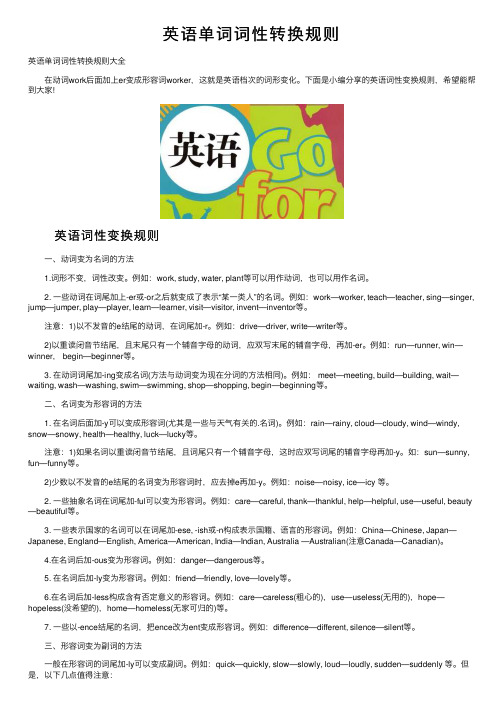
英语单词词性转换规则英语单词词性转换规则⼤全 在动词work后⾯加上er变成形容词worker,这就是英语档次的词形变化。
下⾯是⼩编分享的英语词性变换规则,希望能帮到⼤家! 英语词性变换规则 ⼀、动词变为名词的⽅法 1.词形不变,词性改变。
例如:work, study, water, plant等可以⽤作动词,也可以⽤作名词。
2. ⼀些动词在词尾加上-er或-or之后就变成了表⽰“某⼀类⼈”的名词。
例如:work—worker, teach—teacher, sing—singer, jump—jumper, play—player, learn—learner, visit—visitor, invent—inventor等。
注意:1)以不发⾳的e结尾的动词,在词尾加-r。
例如:drive—driver, write—writer等。
2)以重读闭⾳节结尾,且末尾只有⼀个辅⾳字母的动词,应双写末尾的辅⾳字母,再加-er。
例如:run—runner, win—winner, begin—beginner等。
3. 在动词词尾加-ing变成名词(⽅法与动词变为现在分词的⽅法相同)。
例如: meet—meeting, build—building, wait—waiting, wash—washing, swim—swimming, shop—shopping, begin—beginning等。
⼆、名词变为形容词的⽅法 1. 在名词后⾯加-y可以变成形容词(尤其是⼀些与天⽓有关的.名词)。
例如:rain—rainy, cloud—cloudy, wind—windy, snow—snowy, health—healthy, luck—lucky等。
注意:1)如果名词以重读闭⾳节结尾,且词尾只有⼀个辅⾳字母,这时应双写词尾的辅⾳字母再加-y。
如:sun—sunny, fun—funny等。
2)少数以不发⾳的e结尾的名词变为形容词时,应去掉e再加-y。
高考英语词性变化归纳整理
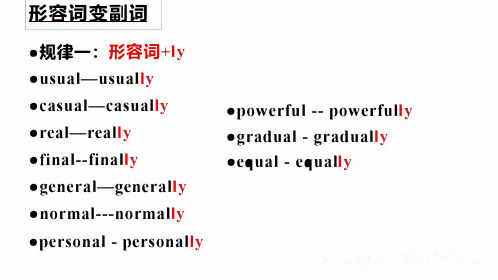
·规律-:形容词+l y •usual-usual l y•casual-casual l y • r eal-real l y •final--final l y •general-general l y •normal---normal l y •personal -personal l y •powerful一powerful l y •gradual -gradual l y •equal -equal l y·规律-:形容词+l y• c omplete-complete l y •fortunate-fortunate l y •polite-polite l y •extreme一-extreme l y •immediate--immediate l y • a pproximate-approximate l y • s evere -severe l y·规律-:形容词+l y •entire -entirely • e xact -exactly •fluent -fluently •freuqent -freuently •regular -regularly • t otal -totally• b rief -briefly •curious -curiously •obvious -obviously • s evere -severely •instant -instantly • c onstant-constantl形窑词变副词·规律二:以le结尾的形窑词去e+y •comfortab le---comfortab l y•gent l e-gent l y• p ossib l e---p o ssib l y•simp le ----simp l y• t errib l e---terrib l y·规律三:以辅音+y结尾的形容词,改y为i+ly•ha pp y-ha pp il y •easy-eas il y •angry-angr il y •merry-merr il y •heavy-heav il y •noisy-nois il y •lucky-luck i l y·规律四:以ic结尾的+all y •energetic-energetic all y •automatic-automatic a ll y •scientific一-scientific a ll y •economic一-economic a ll y •basic-basic ally •logic-logic ally形容词变副词·特殊•t r u e-t r u l y •w h o l e-w h o l l y •s o l e一-s o l e l y •full-fully •g o o d--w e l l•agree同意→dis agree不同意• a dvantage n.优势:便利→di s advantage n.不利条件:不便之处•like v.喜欢prep.像→dis like v不喜欢;厌恶→un like prep.与......不同:不像•fair adj.公平的→un fair adj.不公正的:不公平的use fu l adj.有用的→use less adj.无用的:无效的harm fu l adj.有害的→harm less adj.无害的self ish adj.自私的→sel fl ess adj.无私的;忘我的in formal adj.非正式的→formal adj.正式的fold v.折叠→un fold v.打开动词变名词•express vt.表达→express io11n.词语;表示;表达•impress vt.使印象深刻;使铭记→i m p ress ion n.印象•advertise vt.&νi.做广告;登广告→advertise ment n.广告•amaze vt.使吃惊:惊讶→amaze ment n.惊奇•judge vt.& n.裁判员:法官:断定:判断:判决→judge ment n.判断力;评价;判决•argue vt.& vi.讨论:辩论:争论→argue ment n.争论;争辩;争吵•achieve vt.完成;达到→achieve ment n.成就;功绩•amuse vt.逗笑;使高兴→amuse ment n.娱乐(活动);消遣•entertain vt.&vi.使欢乐;款待→entertain ment n.娱乐•treat vt.&νi.治疗;对待;款待n.款待;招待→treat ment n.治疗;疗法;对待;待遇•settle v.定居;解决→settle ment n.定居;解决•a叶just vt.调整;调节→adjust ment n.调整;调节•announce vt.宣布;通告→announce ment n.宣布;通告•assess vt.评估;评定→assess ment n.评定;评价•equip vt.&vi.配备;装备→equ i p m ent n.设备(不可数)•arrange vt.筹备,安排,整理→arrange1nent n.筹备,安排•deci de vt.决定→deci sion n.决定•explo de vi.爆炸→explo sion n.爆炸•conclu de vt.&νi.结束;推断出→conclu sion n.结束:结尾;结论•persua de v.劝说→persua sion n.劝说,说服•gra d ua te vi.毕业n.大学毕业生→gra du a tion n.毕业•calcula te vt.计算→calcula tion n.计算:盘算→calculator n.计算器•congratula te v.祝贺→congratula tion n.祝贺;(复数)贺词•educa te vt.教育;训练→educa tion n.教育•con t ribu te vt.&νi.捐献:贡献:捐助→contri b u tion n.捐献:贡献;捐助•devo te vt.(与to连用)献身:专心于→devo tion n.投入:热爱•associa te vt.把...联系起来→associa tion n.社团;联系;联想concentra tion n.专心;集中•attract vt.吸引;引起→attract ion n.吸引;吸引力;吸引人的事物•select vt 挑选:选择→select ion n.选择:选拔•protect v.保护→protect ion n.保护•instruct vt .命令:指示:教导→ins t ruc t ion n.教育:说明:指导:教训•construct vt.建设;修建;创建→construct ion n.建设;建筑物•compet e vi.比赛;竞争→compet ition n.比赛;竞争V.应用;涉及:申请→appl ication n.应用;用途:申请•appl y •recogni ze vt.辨认出;承认;公认→recogni tion n. 认出;认识•descri be vt.描写 ; 形容→descri ption n. 描写;描述•admi t vt.& vi.容许;承认;接纳→admi ssion n.准入;准许•permi t vt.允许→permi ssion n.允许•suffer vi.遭受;经历;忍受→suffe ri11g n.折磨;痛苦•misunderstand vt.误解;误会→misunderstand ing n.误解;误会•surround vt.& vi.包围;围绕→surround ing n .(复)周围的事物;环境•prefer vt.更喜欢:选择某事物(而不选择其他事物)→p refer ence n.优先选择;偏爱n.参考;参照;涉及•fail vi.失败→fail ure n.失败(者)•press vi.&vt.按:压;逼迫→press ure n.压力•mix vt.& vi.混合:调配→mix ture n.混合(牛奶:混合状态•perform vt.&νi.表演;履行;执行→perform ance n.表演;•assist vt.帮助;协助:援助→assist ance n.帮助;协助•tolera te vt.容忍;忍受→toler ance n.容忍;忍受•exist vi.存在;生存→exist ence n.存在;生存;生活(方式)• b elie ve vt.相信→belie f n .信任;信心;信仰•r e l i e ve vt.减轻,减缓→re l i e f n.减轻,解脱,救援•strength en vt.JJ日强;强化→strength n.力量;强项•behav eνt.&νi.举动;(举止或行为)表现→behav iot1r n.行为;举止;习性•succe ed vi.成功vt.接替;继任→succe ss n.成功•ty p e vt.& vi.打字n.类型→ty p ist n.打字员•cycl e vi.骑行,骑自行车→cycl is t n.骑自行车的人•design vt.设计;计划;构思→design er设计者•explore νt.&vi.探索:探究→explor er n.探险家:勘探者•perf'o rm vt.& vi.表演;履行;执行→perform er n.表演者•photograph n.照片νt.给...照相→photograph er n.摄影师•settle v.定居;解决→settl er n.定居者•emp l oy vt.雇用:利用(时间、精力等)→emp l oy er n.雇主→employ ee n.雇员:雇工•compet e vi.比赛;竞争→compet ito1·n.竞争者•su1·viv e vi.幸免;幸存;生还→surviv o1·n.幸存者•assist vt.帮助;协助;援助→assist ant n.助于:助理;售货员•appl y v.应用:涉及;申请→:1ppl icant n.申请人:求职者•1--epresent v.代表→1·epresent ative n.代表:典型人物•delight n.快乐;高兴;喜悦νt.使高兴;使欣喜→deli gh t ed a功.高兴的;快乐的•i mpress vt.使印象深刻;使铭记→impress ive aφ给人深刻印象的;感人的•instruct vt.命令;指示;教导→instruct ive adj.富有教益的;有启发的•protect v.保护→protect ive adj.保护的;防护的• a ttract vt.吸引;引起→attract ive adj.吸引人的;有吸引力的•compete vi.比赛;竞争→compet itive adj.竞争的;有竞争性的•harm vt.&n.损害;危害→harm ful adj.有害的→harm less adj.无害的•demand n.需求;要求vt.强烈要求→demand ing adj.要求高的;费力的动词变名词•respect v t.& n.尊敬;尊重;敬意→respe c t able adj.值得尊敬的→respect ful adj.尊敬的;恭敬的•responsibility n.责任;职责→respons ible aφ.有责任心的•rely v.依赖;依靠→rel iable adj.可信赖的;可靠的• b enefit n.利益;好处vt.&νi.有益于;有助于→benef icial adj.有益的•hunger n.饥饿;欲望vt.&vi.(使)饥饿→hungr y adj.饥饿的:渴望得到的• b ase vt.以......为根据n.基音I�;基地;基础→bas ic adj.基本的:基础的名词变形容词」• intelligence n. 智力; 聪明→intelligen t adJ .. 智能的•confidence n. 自信;信任→ confiden t adj. 自倍的; 确信的•independence n. 独立;自主 →independen t adj.独立的;自主的•evid.e nce n. 根据; 证据→eviden t adj. 明显的; 清楚的•violence n. 暴力; 暴行→ violen t adj.暴力的•patience n. 耐性; 忍耐→pa t ien t adj.有耐心的•distance n. 距离; 远方→distan t adj.遥远的•convenience n. 便利; 方便→convenien t adj.方便的;便利的名词变形容词•power n.能力;力量;权力→pow e r ful adj.有权势的;强有力的•success n.成功→su cc ess f ul adj.成功的•mercy n.仁慈;宽恕;怜悯→merci ful adj.仁慈的;慈悲的;宽容的→merc iless adj.残忍的• l1u1nour n.幽默→l1u1nour ous adj.幽默的:诙谐的•curiosi t y n.好奇心→curi ous adj.好奇的•religion n.宗教:宗教信仰→religi ou s adj.宗教的:虔诚的•poison n.毒药:毒害vt.毒害;使中毒→poison ous adj.有毒的;有害的名词变形窑词•tradition n.传统;风俗→tradition al oφ传统的•profession n.职业;专业→profession al adj.专业的;职业的n.专业人员•greed n.贪欲;贪婪→greed y adj.贪吃的;贪婪的;贪心的•dust n.灰尘→dust y adj.积满灰尘的•wealth n.财富→wealth y adj.& n.富有的;富人;有钱人•guilt n.内疚;羞愧;罪;罪行→guilt y adj.犯罪的;有罪的;内疚的•possibility n.可能(性)→possi ble adj.可能的•ability n.能力→a ble adj.能够,有能力的。
英语词性转换七大规则表
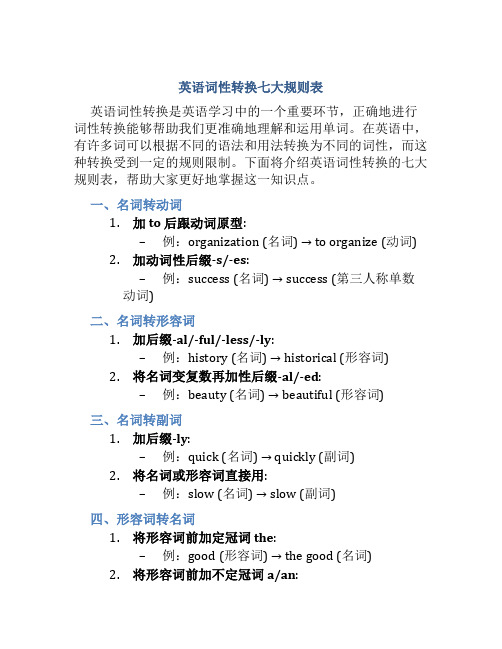
英语词性转换七大规则表英语词性转换是英语学习中的一个重要环节,正确地进行词性转换能够帮助我们更准确地理解和运用单词。
在英语中,有许多词可以根据不同的语法和用法转换为不同的词性,而这种转换受到一定的规则限制。
下面将介绍英语词性转换的七大规则表,帮助大家更好地掌握这一知识点。
一、名词转动词1.加 to 后跟动词原型:–例:organization (名词) → to organize (动词)2.加动词性后缀-s/-es:–例:success (名词) → success (第三人称单数动词)二、名词转形容词1.加后缀-al/-ful/-less/-ly:–例:history (名词) → historical (形容词)2.将名词变复数再加性后缀-al/-ed:–例:beauty (名词) → beautiful (形容词)三、名词转副词1.加后缀-ly:–例:quick (名词) → quickly (副词)2.将名词或形容词直接用:–例:slow (名词) → slow (副词)四、形容词转名词1.将形容词前加定冠词 the:–例:good (形容词) → the good (名词)2.将形容词前加不定冠词 a/an:–例:beautiful (形容词) → a beauty (名词)五、形容词转动词1.将形容词前加连系动词be:–例:easy (形容词) → are easy (动词)2.将形容词前加非谓语动词to:–例:important (形容词) → to important (动词)六、形容词转副词1.加后缀-ly:–例:quick (形容词) → quickly (副词)2.保持原貌:–例:fast (形容词) → fast (副词)七、副词转形容词1.去掉-ly加后缀-al:–例:naturally (副词) → natural (形容词)2.通过加more/less来表示不同级别的比较:–例:softly (副词) → less softly (形容词)以上是英语词性转换的七大规则表,通过掌握这些规则,我们可以更好地理解单词之间的转换关系,从而提升英语学习的效率和准确性。
英语词性变化对照表

desperate
desperately
毁坏
destruction
destroy
下决心
determination
determine
determined
发展
development
develop
不同的
difference
different
differently
困难的
difficulty
difficult
permit
人
person
personality·人格
personal·个人的
personally·亲自
物理
physics
Physical
physically
政策
policy
politician·政治家
politics·政治
Political
politically
拥有
possession·财产
possess
loud
修改
alternative·选择
alter
alternative·两者择一的
惊奇
amazement
amaze
amazed·感到惊奇的
amazing·令人惊奇的
发笑
amusement·娱乐
amuse
amused·感到可笑的
amusing·令人发笑的
分析
analysis
analyse
愤怒
anger
电
electricity
electric·电动的
electrical·与电有关的
electronic·电子的
使窘迫
embarrass
高中英语词性变化最全总结
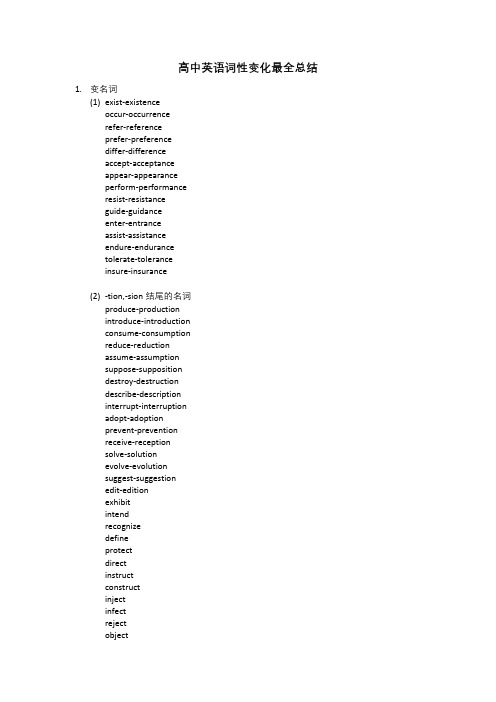
高中英语词性变化最全总结1.变名词(1)exist-existenceoccur-occurrencerefer-referenceprefer-preferencediffer-differenceaccept-acceptanceappear-appearanceperform-performanceresist-resistanceguide-guidanceenter-entranceassist-assistanceendure-endurancetolerate-toleranceinsure-insurance(2)-tion,-sion结尾的名词produce-productionintroduce-introductionconsume-consumptionreduce-reductionassume-assumptionsuppose-suppositiondestroy-destructiondescribe-descriptioninterrupt-interruptionadopt-adoptionprevent-preventionreceive-receptionsolve-solutionevolve-evolutionsuggest-suggestionedit-editionexhibitintendrecognizedefineprotectdirectinstructconstructinjectinfectrejectobjectconnect inspect selectelect restrict contradict reserve preserve conserve observe stave organize civilize realize examine determine forminform imagine transport invite expect tempt adapt immigrate imitate prepare explore consider declare decorate inspirerelax communicate occupy satisfy applyimply recommend interpret combine operate hesitate educate locate indicate participateappreciateassociateseparatehibernatecompensateinvestigatecelebratecongratulatetranslateaccumulateacceleratedonateliberatemotivateinnovateconcentratedemonstratecontributedistributepromotedevotededicatefrustratedepressimpressexpresspossessdiscussexpandextendadmitpermitemitexplodeconcludedecidedivideconfuse(3)-ment 结尾的词advertiseagreeamazeastonishannouncearrangeassessdisappointemployencourageentertainequipgovernimproveinvestinvolvemanagepunishrequireretiresettlestatetreatbasepaveachieveaccomplish (4)ness-结尾的名词adj.→n.awareconsciousbitterblindcalmclevercrazyeagerfairfoolishfithappyillkindlazylonelyquietsadserioussweetsteadythicktiredweakcoldhomesickcarelessselfishselflessunselfishhelplesshopeless(5)-age 结尾的名词marryshortstorepackcarrypass(6)-th 结尾的名词warmtruedeadgrow(7)-ure结尾的名词pleasedepartexposepressfailmixsign(8)-ce结尾的名词adj.→n.absentpresentconfidentconvenientdifferentdiligentdistantevidentexcellentimportantindependentinnocentintelligentjustpatientsilentviolentv.→n.offenddefendadvisedevise(9)-dom结尾的名词freekingwise(10)-hood结尾的名词childhoodboyhoodneighbourhood(11)-ship 结尾的名词ownershipchampionshipfriendshipcraftsmanshipscholarshipleadershiphardshiprelationship(12)-ing 结尾的名词farminggardeningpaintingdrawingtape-recordingfeelingearningssavingsfindingssufferingssurroundingsweight-liftingwrestlingwarmingschoolingmeaningtrainingcrossinggreetingshappeningsbelongingsofferingsbowlingshooting2.变形容词n→adj -yhealthtasteicen→adj -al -ialglobemusicnature-ful, -less 结尾thankplentysuccessfaith–(i)ous 结尾的形容词n.→adj.number- numerousmountain-mountainousadventure-adventurousv.→adj. -able -iblepredict-predictableavoid-avoidableforget-forgettabledesire-desirablecomfort-comfortable-tive 结尾的形容词v.→adj.produce-productive attract-attractive create-creativeprotect-protective (1)-yn.→adj.sunsnowstormfogicestardusthealthbosstasteskinspeedtrickrainwindchillfrostgloommuddirtwealthsmellsaltgreedv.→adj.choosepickstickcatchscareslip(2)-al, -ial 结尾的形容词n.→adj.globecultureagriculturesituationconditionenvironmentchemistrymedicineoriginpoliticspracticetheorymusicemotionnationnaturepersonoccasionmindphysicsaccidenteducationtechniquepsychologycoastracefaceindustryfinancecommerceofficebenefittypeinfluence(3)-ful, -less 结尾thankplentysuccessfaithpeacejoycheerspotendhomejobpennyselfaimwirelimitpricevalueworthspeechbreathcarecolorusefruitpowermeaningpainregretharm-harmful,harmlessrest-restful, restlessgrace-graceful, gracelesshope-hopeful,hopelesshelp-helpful, helplessthought-thoughtful, thoughtless (4)–(i)ous 结尾的形容词n.→adj.number- numerousmountain-mountainousadventure-adventurousnerve-nervouspoison-poisonousdanger-dangerousdisaster-disastrouscaution-cautiousnutrition-nutritiousreligion-religiousspace-spaciousambition-ambitiousmystery-mysterious(5)-able, -(s)ible结尾的形容词predict-predictableavoid-avoidableforget-forgettabledesire-desirablecomfort-comfortablefavour-favourablesuit-suitablebear-bearableendure-endurablebelieve-believablecredit-credibleaccess-accessibleview-visiblecure-curableafford-affordableadapt-adaptablerenew-renewableport-portablechange-changeableeat-eatablerely-reliablework-workablevalue-valuablereason-reasonableenjoy-enjoyablefashion-fashionable (6)-tive 结尾的形容词v.→adj.produce-productiveattract-attractivecreate-creativeprotect-protectiveprevent-preventativetalk-talkativealter-alternativerelate-relativeinstruct-instructivecompete-competitiven.→adj.effect-effectiveexpense-expensive(7)-tic,-fic 结尾的形容词system-systematicscience-scientificdrama-dramaticromance-romanticsympathy-sympatheticenergy-energetic(8)-en 结尾的形容词wool-woolengold-goldenwood-wooden(9)以-some 结尾的形容词hand-handsomeawe-awesometrouble-troublesometire-tiresome(10)-ly 结尾的形容词dead-deadlylive-livelyfriend-friendlybrother-brotherlyorder-orderlycost-costlymonth-monthlyday-daily3.变动词(1)-fy 结尾的动词pure-purifysimple-simplifybeautiful-beautifyjust-justifyterrible-terrifyhorrible-horrifyquality-qualifyclass-classifyidentity-identify(2)-ize结尾的动词adj.→v.real-realizemodern-modernizeindustrial-industrializepopular-popularizecentral-centralizeglobal-globalizeideal-idealizestable-stabilizenormal-normalizesocial-socializespecial-specializen.→v.material-materializesummary-summarizememory-memorize(3)-en结尾的动词dark-darkenquick-quickensharp-sharpenweak-weakenloose-loosentight-tightensoft-softenbright-brightenbad-worsenlittle-lessenlight-lightenblack-blackenbroad-broadenshort-shortenadj.-n.-v.deep-depth-deepenlong-length-lengthwide-width-widenhigh-height-heightenstrong-strength-strengthen(4)-e 结尾的动词(注意发音变化):n.-v.bath-bathebreath-breathecloth-clothe。
- 1、下载文档前请自行甄别文档内容的完整性,平台不提供额外的编辑、内容补充、找答案等附加服务。
- 2、"仅部分预览"的文档,不可在线预览部分如存在完整性等问题,可反馈申请退款(可完整预览的文档不适用该条件!)。
- 3、如文档侵犯您的权益,请联系客服反馈,我们会尽快为您处理(人工客服工作时间:9:00-18:30)。
英语词性变化一万个字,我怕写不下.还有我不要那个QB,就是大过年的为人排忧解难就心里舒服,呵呵,交个朋友更好,如果你看的起我.QQ330968442/kaoshi/english/PETS/PETSb/200501/kaoshi_19216.html(1)名词100个一、最常见的名词复数(Plural)就是在单数(Singular)名词后边加上一个sboy boyscat catsroom roomshorse horsestree treesrose roses二、如果名词是以sh,ch,s或x结尾的话,那就要在单数的后面加上eslash lashes 鞭子push pushesbranch branchesmatch matchescoach coaches 教练gas gasesass asses 驴子class classesbox boxesfox foxes三、如果名词结尾是一个子音(consonant,就是除了a,e,i,o,u之外的字母)加一个y,那就要将y换成i,再加上esbaby babiesfamily familiespony poniescity citiescountry countries四、可是,如果名词结尾是一个母音(vowel,就是a,e,i,o,u)加一个y,那只要在单数词后加一个s就成了play playsway waysvalley valleys 山谷donkey donkeystoy toysboy boysguy guys五、当单数名词的结尾是f或fe时,复数的写法就是将f改为v,再加esthief thievesshelf shelvesleaf leavescalf calveshalf halveswolf wolveswife wiveslife lives可是,f结尾的单数字,有许多只需加个s就成复数(你看,这又是英文的bugs)roof roofshoof hoofschief chiefscliff cliffsgulf gulfs六、结尾是o的单数词,一部份只加s就成复数词,但有的却需加es,真令人捉摸不定呀piano pianosphoto photosbamboo bambooszoo zooskangaroo kangaroos 袋鼠mulatto mulattos 白黑混血儿hero heroesmango mangoespotato potatoesvolcano volcanoesnegro negroes 黑人cargo cargoesecho echoesbuffalo buffaloestomato tomatoesmosquito mosquitoes七、由于古老传统的原因,一些单数词得加en才能变成复数词(鬼知道是什么原因):ox oxenchild children (你看,这个就不守规矩了,不是加en ,是ren呀) brother brethren (哎呀,这个这个……是bre,不是bro)八、一些单数词得改头换面一番,才能变成复数词的哦:analysis analyses 分析basis bases 基础datum data 数据foot feetformula formulae/formulas 公式goose geeselouse lice 虱子man menmouse micemedium media/mediums 媒介memorandum memoranda/memorandums 备忘录parenthesis parentheses 圆括号phenomenon phenomena 现象radius radii 半径tooth teethwoman women九、有些名词是单数、复数不分的,很可爱是吗?deerfishcannonsheepsalmon 鲑鱼trout 鳟鱼(许多鱼类都是这么"可爱"的呀。
)十、一些名词虽分单数、复数,但出现次数多的总是单数词:abscenceclothingfilmhelpfurniture 家具machinery 机械newsscenery 风景sugartraffic 交通十一、另一些名词则以复数词出现的机会较多:bellows 风箱clothespoliceshorts 短裤scissors 剪刀spectacles 眼镜shears 大剪刀trousers 长裤wages 工资十二、最后一类是compound nouns,这类复数词是以主要的名词来表示:coat-of-mail coats-of-mail 锁子甲daughter-in-law daughters-in-law 媳妇father-in-law fathers-in-law 岳父man-of-war men-of-war 兵舰maid-servant maid-servantsstep-son step-sons 晚子son-in-law sons-in-law<><><><><><><><><><><><><><><><><><><><><><><><><>名词复数的不规则变化1)child---children foot---feet tooth---teethmouse---mice man---men woman---women注意:与 man 和 woman构成的合成词,其复数形式也是 -men 和-women。
如: an Englishman,two Englishmen. 但German不是合成词,故复数形式为Germans;Bowman是姓,其复数是the Bowmans。
2)单复同形如:deer,sheep,fish,cattle, deer, salmon, Chinese,Japaneseli,jin,yuan,two li,three mu,four jin但除人民币元、角、分外,美元、英镑、法郎等都有复数形式。
如:a dollar, two dollars; a meter, two meters3)集体名词,以单数形式出现,但实为复数。
如: people police cattle 等本身就是复数,不能说 a people,a police,a cattle,但可以说a person,a policeman,a head of cattlethe English,the British,the French,the Chinese,the Japanese,the Swiss 等名词,表示国民总称时,作复数用。
如: The Chinese are industries and brave. 中国人民是勤劳勇敢的。
4)以s结尾,仍为单数的名词,如:a. maths,politics,physics等学科名词,为不可数名词,是单数。
b. news 是不可数名词。
c. the United States,the United Nations 应视为单数。
The United Nations was organized in 1945. 联合国是1945年组建起来的。
d. 以复数形式出现的书名,剧名,报纸,杂志名,也可视为单数。
"The Arabian Nights" is a very interesting story-book.<<一千零一夜>>是一本非常有趣的故事书。
5) 表示由两部分构成的东西,如:glasses (眼镜) trousers, clothes若表达具体数目,要借助数量词 pair(对,双); suit(套); a pair of glasses; two pairs of trousers6)另外还有一些名词,其复数形式有时可表示特别意思,如:goods货物,waters 水域,fishes(各种)鱼(2动词)以下写出它们的现在分词和单三.be build buy can catcham,is choose come cost cutare dig draw drink drivebeat fall feel find flybecome forget freeze grow hangblow hear hide hit holdbreak hurt keep know laybring leave lend let lielose may mean meet mistakeride ring rise run saysee sell send shall shineshow shut sink sleep smellspeak spend spill spit spoilstand steal sweep teach tellthrow understand wake pay willwin die以下写出过去式和现在分词,单三.look start livehope use stop plan studycarry worry talk snow washugree decide discuss shop wait travel walk turn cool need relax follow close help talk enjoy解be being is/ambuild building buildsbuy buying buyscan (无)(无)catch catching catchesam (无)(无)is(无)(无)choose choosing choosescome coming comescost costing costscut cutting cutsare(无)(无)dig digging digsdraw drawing drawsdrink drinking drinksdrive driving drivesbeat beating beatsfall falling fallsfeel feeling feelsfind finding findsfly flying fliesbecome becoming becomesforget forgetting forgetsfreeze freezing freezesgrow growing groweshang hanging hangsblow blowing blowshear hearing hearshide hiding hideshit hitting hitshold holding holdsbreak breaking breakshurt hurting hurtskeep keeping keepsknow knowing knowslay laying laysbring bringing bringsleave leaving leaveslend lending lendslet letting letslie lying lieslose losing losesmay (无)(无)mean meaning meansmeet meeting meetsmistake mistaking mistakesride riding ridesring ringing ringsrise rising risesrun running runssay saying sayssee seeing seessell selling sellssend sending sendsshall (无)(无)shine shining shinesshow slowing slowsshut shutting shutssink sinking sinkssleep sleeping sleepssmell smelling smellsspeak speaking speaksspend spending spendsspill spilling spillsspit spitting spitsspoil spoiling spoilsstand standing standssteal stealing stealssweep sweeping sweepsteach teaching teachestell telling tellsthrow throwing throwsunderstand understanding understandswake waking wakespay paying payswill (无)(无)win winning winsdie dying dies写“无”的都是情态动词或者be动词,这些词没有现在进行时和单三--Will(3)形容词比较级英语形容词比较级(一)一般句式的构成: A + is / are+ 形容词比较级+ than + BA 是主格B 是宾格如: She is taller than me.主格形容词比较级宾格(二)英语形容词比较级的构成英语形容词比较等级有三个:原级,比较级和最高级。
